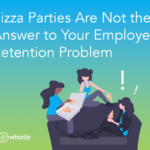Your Employees Are Not Quitting Because of Compensation.
Learn the real reason why your employee retention is so low.
Stephanie decided she would quit her job at the end of the month. After three years, she was tired and frustrated by her manager. She wanted to find a job where she had better growth opportunities and felt more appreciated for her contributions. Stephanie quit her job even before finding her next opportunity because she was confident she would find a better opportunity in today’s marketplace.
More employees left jobs in the first quarter of 2022 without a replacement job than ever before. On top of low employee retention, HR leaders across the country are facing wage inflation not seen since the 1980’s. It’s no wonder companies feel like employees are leaving for more compensation. Often that is what they hear from departing staff. However, dig a little deeper and it becomes clear this is not the case.
Employers have a basic misunderstanding of why their people quit. In a recent study, employers ranked the top reasons for employee attrition as:
- Looking for a better job
- Inadequate compensation
- Poor health
The three reasons cited by employees, however, were entirely different:
- Not feeling valued by the organization
- Not feeling valued by their manager
- Lacking a sense of belonging
The reasons companies fail to gain a full understanding of employees’ true reasons for leaving often come down to flaws in the way employers go about seeking that information. More specifically, there is a mismatch between the motivations of the people involved in the exit process and the social, emotional, and practical incentives built into the process itself.
First, consider the perspective of the person who is leaving. Employees are disincentivized to describe the real issues that are most likely compelling them to leave. For example, there is nothing to be gained by describing the lack of appreciation, feedback, guidance, etc. from a supervisor. At a minimum, it will be uncomfortable, and it could potentially offend someone or burn a future bridge. Similarly, there’s no point in discussing issues with broader culture because by the time they leave, they have concluded that those issues will never change. It is much cleaner for a departing colleague to mention a higher salary. No one can argue with them, no one will be offended, and the conversation will be over quickly.
Second, employers typically attempt to understand why people leave using exit interviews completed by HR. These HR associates generally do not have a full understanding of the associate’s role, the social dynamics of their team or area, what concerns they’ve raised in the past months or years, etc. So they simply do not know the right questions to ask to lead to a more honest and nuanced understanding of the associate’s complaints. Also, there is no real motivation for them to dig more deeply, as their task is simply to complete the exit interview as quickly (and comfortably) as possible. This leads to vague open-ended questions such as, “why are you leaving?” – followed by no real probing as to deeper concerns on the part of the employee. And in many cases, it benefits HR to cite salary as the primary reason. If it were related to organizational culture, opportunities for growth, feelings of psychological safety, etc. then they may be tasked with improving those things, and they may look bad if they fail to do so.
For many companies, the systems are set up to encourage both parties to complete the exit process quickly and with as little discomfort and risk as possible. Unfortunately, this prevents meaningful conversations that might inform the company of what changes could truly improve workers’ connection to the company and improve future retention.
Whistle research on the Employee Hierarchy of Needs decomposes the six needs of the employee and specific ways to think about each. There are a variety of tools that can help companies to meet each type of need, often at a lower cost than they expect.
One of the most powerful tools that is routinely overlooked is onboarding. Onboarding is the first step of retention. In the first 90 days employees are determining if your company is the right place for them. They may not make a move right away, but it’s those first few days and weeks that set the tone of your employee’s experience and expectations for both retention and productivity. Unfortunately, most organizations treat the onboarding experience like a trip to the dentist: just get it over with.
Supervisors are critical to retention. Many have heard the phrase, “you don’t leave a job, you leave a boss”. Unfortunately, many supervisors are not set up for success. They typically don’t receive any training for the new role of managing people and are left to guess their way. 40% of companies reported providing only half a day or less of new manager training in a recent Whistle survey. Providing training to supervisor staff focused on people management tools can have big impacts on retention and productivity. But, this training must be in small, “micro” segments and available where the supervisors are: on their phones. Companies that provide more than a full day of new manager training (vs an hour or less of training) improve employee retention from 34% to 74%!
Once supervisors are trained, they should be empowered. Large scale survey research shows companies need to focus on improving employees’ sense of belonging and value. This task is made even more challenging as work shifts away from the office and into a hybrid or remote work experience. The one-size-fits-all approach to employee experiences doesn’t work. The standard pizza party was never that good and has only gotten worse during the pandemic. Teams need rewards and recognition that are relevant to that group, at that time. Companies should look for ways to empower supervisors to make their team members feel a sense of value and belonging. For example, this could be in the form of a “team budget” for each supervisor, allowing maximum discretion for each leader to identify what matters to each team member.
Fortunately, there are new tools and systems being created that can help companies retain talent in creative ways. For example, Whistle recently worked with a manufacturing and distribution company to design an improved onboarding experience and accelerate the processing of bonus payments. In less than two months employee retention increased 26% saving the company millions of dollars in lost productivity and replacement costs. Additionally, Whistle technology enables employers to take employee “pulse checks” to pinpoint areas of strength and weakness in an anonymous context, so they can know what’s really on people’s minds before it’s too late.
Contact us to learn more about how Whistle can quickly improve employee retention by helping create a better work experience. From better onboarding to culture budgets that empower your teams, Whistle gives companies a secret weapon in the competition for talent.

Drew Carter is the CEO and Co-founder of Whistle. Drew brings a combination of executive leadership, business strategy, technical software experience and data analytics to his work. He has worked in large and small corporations, worked in industry building software products enjoyed by millions and served as a consultant helping companies better compete in the digital age.









